Survey of Economic and Social Developments in the Arab Region
| Publication Cover | Title |
|---|---|
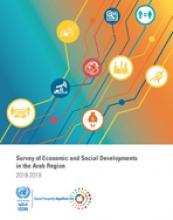 |
Survey of Economic and Social Developments in the Arab Region 2018-2019 E/ESCWA/EDID/2019/1 The Survey 2018-2019 observes that the Arab region experienced an economic recovery with a growth rate of 2.3% in 2018, up from 1.7% the year before. This recovery was largely attributed... |
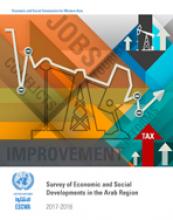 |
Survey of Economic and Social Developments in the Arab Region 2017-2018 E/ESCWA/EDID/2018/1 The Arab region continues to manage uncertainties on its path towards an inclusive and sustainable growth trajectory: geopolitical tensions persist, and global interest rates have soared. The... |
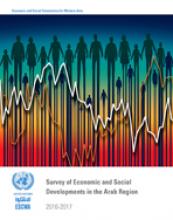 |
Survey of Economic and Social Developments in the Arab Region 2016-2017 E/ESCWA/EDID/2017/1 The 2016-2017 edition of the Survey of Economic and Social Developments in the Arab Region provides a rigorous assessment of the socioeconomic situation and prospects for Arab... |
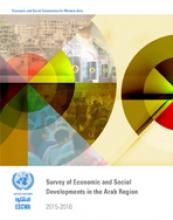 |
Survey of Economic and Social Developments in the Arab Region 2015-2016 E/ESCWA/EDID/2016/1 The economic and political uncertainty that has characterized the Arab region since the uprisings of 2011 continues to dampen its prospects for growth, job creation and stability. Economic... |
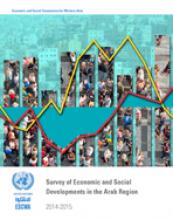 |
Survey of Economic and Social Development in the Arab Region 2014-2015 E/ESCWA/EDID/2015/2 Over the past few years, the Arab region has witnessed various events and developments, including political and social crises, armed conflict and a sharp drop in the global price of oil... |
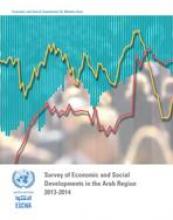 |
Survey of Economic and Social Developments in the Arab Region 2013-2014 E/ESCWA/EDGD/2014/3 The Arab region witnessed slower economic growth in 2013 compared to 2012, owing mainly to the moderate growth in oil revenues of major oil exporting countries. The region is increasingly seen... |
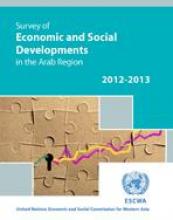 |
Survey of Economic and Social Developments in the Arab Region 2012-2013 E/ESCWA/EDGD/2013/3 Arab countries exhibited increasing polarization in their development paths in 2012 and 2013. Major energy exporters, namely Gulf Cooperation Council (GCC) countries, are recovering from the... |
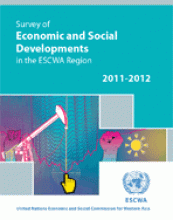 |
Survey of Economic and Social Developments in the ESCWA Region, 2011-2012 E/ESCWA/EDGD/2012/2 This Survey assesses the economic and social developments in the ESCWA region using data that became available by the second quarter of 2012. It finds that growth in gross domestic product (GDP)... |
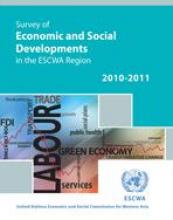 |
Survey of Economic and Social Developments in the ESCWA Region, 2010-2011 E/ESCWA/EDGD/2011/8 In a very highly volatile and changing scene in the aftermath of the Arab uprising, understanding the present in view of the recent past and projecting the near future is almost an impossible... |
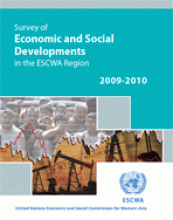 |
Survey of Economic and Social Developments in the ESCWA Region, 2009-2010 E/ESCWA/EDGD/2011/1 This year's Survey looks at the effect that the 2008 global financial crisis had on economies and social development in the Economic and Social Commission of Western Asia (ESCWA) region. Like... |
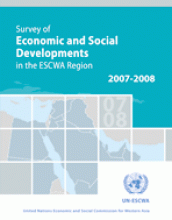 |
Survey of Economic and Social Developments in the ESCWA Region, 2007-2008 E/ESCWA/EDGD/2008/3 For more than three decades, the ESCWA region has been exporting capital; experiencing volatile real gross domestic product (GDP) per capita growth; has the highest unemployment rate globally;... |
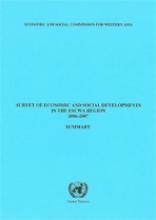 |
Survey of Economic and Social Developments in the ESCWA Region, 2006-2007 E/ESCWA/EAD/2007/4 This issue of the Survey focuses on the robust economic expansion experienced by most ESCWA member countries during the period 2006-2007, with the exception of Iraq, Lebanon and Palestine,... |
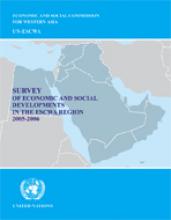 |
Survey of Economic and Social Developments in the ESCWA Region, 2005-2006 E/ESCWA/EAD/2006/2 The Survey reports on the most recent economic and social developments in the region and makes policy recommendations based on an in-depth analysis of regional development issues. The main theme... |
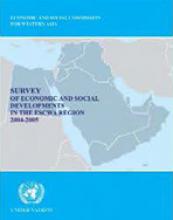 |
Survey of Economic and Social Developments in the ESCWA Region 2004-2005 E/ESCWA/EAD/2005/6 Development under risk represents a collective challenge to the ESCWA region. The theme for this year's Survey is "strategies for development out of crisis conditions", which falls into three... |





